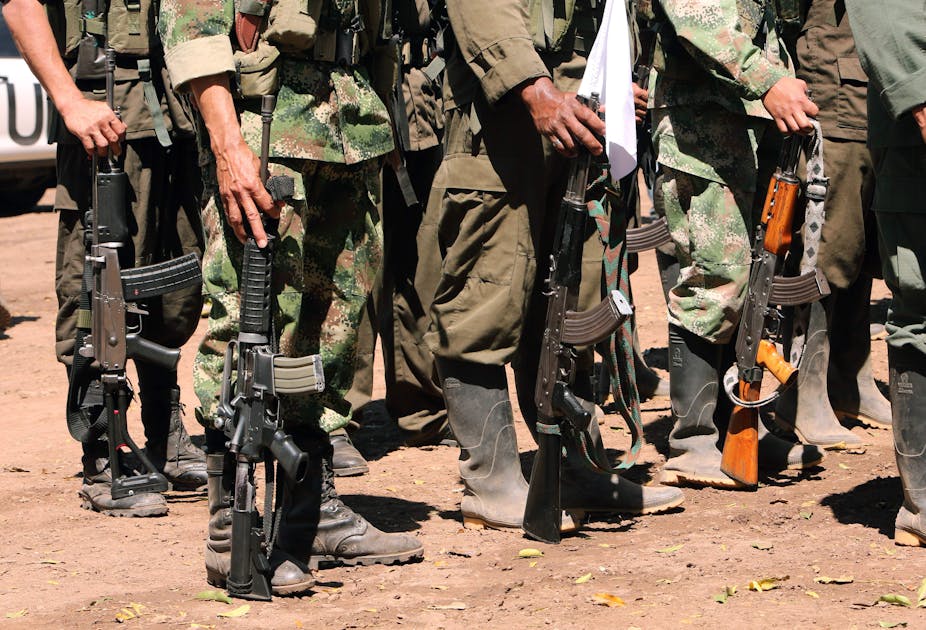After five decades of fighting, and an estimated 260,000 deaths, the conflict between Colombia and the rebel group FARC is at an end. A peace agreement that was narrowly rejected in a referendum has been revised, amended and approved. But now the process moves to the delicate post-conflict phase – implementing the agreement in pursuit of lasting peace.
One major part of the peace agreement focuses on the difficult task of providing justice for victims. Allowing impunity for serious crimes committed during the conflict would jeopardise attempts to build a stable future. Post-conflict war crimes trials strengthen a society’s political identity as a state which abides by the rule of law. They also provide a measure of accountability for crimes suffered by the Colombian people.
But this kind of transitional justice process takes place in the context of a fragile political balance of power. In these circumstances, states may appear unwilling or unable to punish those most responsible. In Colombia, there are signs that following the referendum, certain provisions of the transitional justice agreement have been made ambiguous or watered down.
To this end, Colombia has been given a rare warning by the International Criminal Court (ICC). Fatou Bensouda, the court’s prosecutor, said that only by adhering to “the promise of accountability” can Colombia “reap the full dividends of peace”.
One of Colombia’s obligations as a signed up member state of the ICC means punishing those “most responsible” for international crimes. Often these will likely be military commanders or superiors, rather than the direct perpetrators of violence. For the ICC, a person will be considered criminally responsible if they “order, solicit or induce” the commission of international crimes.
Military commanders will be criminally responsible for crimes committed by forces under their effective command and control. This includes occasions when they knew or should have known that their forces were “committing or about to commit” crimes. Non-military commanders will be criminally responsible when they knew, or consciously disregarded, information which clearly indicated the commission of crimes.
The parties involved in the Colombian peace process have agreed that international law is directly applicable to post-conflict disputes over human rights and criminality. But Bensouda correctly highlighted apparent confusion over how the law of command responsibility will be interpreted.
As Bensouda noted, the ICC definition allows prosecution of a military commander “as long as they have information that would have put them on notice”. This is the interpretation that the ICC adopted when it found the former vice-president of the Democratic Republic of the Congo, Jean Pierre Bemba, guilty of international crimes committed by his subordinates.
But some aspects of the Colombian peace agreement cast doubt over whether this interpretation will be followed, especially in relation to commanders of FARC. The agreement states that criminal responsibility of FARC commanders will be engaged only if they have “actual knowledge based on information available to them, before, during and after” the relevant criminal activity. This is a much higher standard of guilt than that which the ICC usually requires. As a result, it may be much harder to prove – and potentially allow those most responsible for international crimes to escape punishment.

The amendments to the Colombian peace agreement cast doubts on whether the government and FARC are fully committed to prosecuting those most responsible for international crimes.
Colombian justice
If the newly formed Colombian Special Tribunal for Peace does indeed adopt an interpretation of the law which is at odds with the ICC, it may be declared “unwilling or unable” to prosecute those most responsible for perpetrating international crimes. There would then be a strong case for the ICC itself to issue the relevant arrest warrants.
There have been calls for the ICC to broaden its geographical scope. The Colombian case may serve as an opportunity to reinvigorate the ICC which has come under sustained criticism as an Afro-centric court. It would be only the second time the ICC had opened an investigation outside of Africa.
Much depends now on the people selected to sit in the relevant courts. A five-member committee will choose over 100 judges who will oversee the diverse chambers of the Special Tribunal for Peace. They should select brave judges who recognise that the prospects of long-lasting peace are harmed when only low-ranking soldiers are charged with crimes of the past. The whole point of transitional justice since the post-World War II Nuremberg trials is that those most responsible for the horrors of the past face justice. Individual criminal justice for international crimes rings hollow unless it is brave enough to pursue the people at the top.

